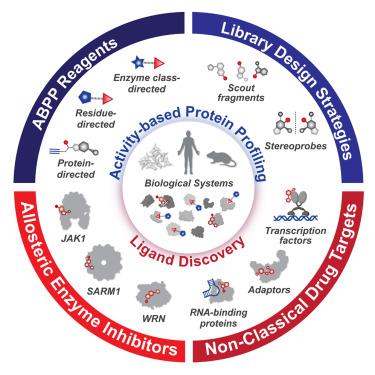Cell Chemical Biology ( IF 6.6 ) Pub Date : 2024-09-19 , DOI: 10.1016/j.chembiol.2024.08.006 Micah J. Niphakis, Benjamin F. Cravatt

|
Genomic technologies have led to massive gains in our understanding of human gene function and disease relevance. Chemical biologists are a primary beneficiary of this information, which can guide the prioritization of proteins for chemical probe and drug development. The vast functional and structural diversity of disease-relevant proteins, however, presents challenges for conventional small molecule screening libraries and assay development that in turn raise questions about the broader “druggability” of the human proteome. Here, we posit that activity-based protein profiling (ABPP), by generating global maps of small molecule-protein interactions in native biological systems, is well positioned to address major obstacles in human biology-guided chemical probe and drug discovery. We will support this viewpoint with case studies highlighting a range of small molecule mechanisms illuminated by ABPP that include the disruption and stabilization of biomolecular (protein-protein/nucleic acid) interactions and underscore allostery as a rich source of chemical tools for historically “undruggable” protein classes.
中文翻译:

通过基于活性的蛋白质分析发现配体
基因组技术使我们对人类基因功能和疾病相关性的理解有了巨大的进步。化学生物学家是这些信息的主要受益者,这些信息可以指导蛋白质的优先排序,用于化学探针和药物开发。然而,疾病相关蛋白的巨大功能和结构多样性给传统的小分子筛选文库和检测开发带来了挑战,这反过来又引发了对人类蛋白质组更广泛的“成药性”的质疑。在这里,我们假设基于活性的蛋白质分析 (ABPP) 通过生成天然生物系统中小分子-蛋白质相互作用的全球图谱,可以很好地解决人类生物学指导的化学探针和药物发现中的主要障碍。我们将通过案例研究来支持这一观点,重点介绍 ABPP 阐明的一系列小分子机制,包括生物分子(蛋白质-蛋白质/核酸)相互作用的破坏和稳定,并强调变构是历史上“不可成药”蛋白质类别的丰富化学工具来源。




















































 京公网安备 11010802027423号
京公网安备 11010802027423号